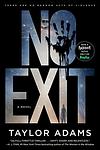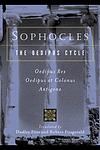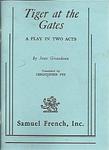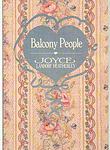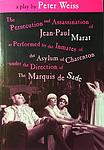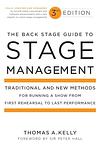The Greatest French, German "Plays, Fiction" Books Since 1910
Click to learn how this list is calculated.
This list represents a comprehensive and trusted collection of the greatest books. Developed through a specialized algorithm, it brings together 305 'best of' book lists to form a definitive guide to the world's most acclaimed books. For those interested in how these books are chosen, additional details can be found on the rankings page.
Genres
Plays are a category of literature that consists of written works intended for performance on stage. They typically feature dialogue between characters and are structured into acts and scenes. Plays can be comedic, tragic, or a combination of both, and often explore themes such as love, power, and morality. They are meant to be performed by actors in front of an audience, and can be enjoyed both as written works and as live performances.
Countries
Date Range
Reading Statistics
Click the button below to see how many of these books you've read!
Download
If you're interested in downloading this list as a CSV file for use in a spreadsheet application, you can easily do so by clicking the button below. Please note that to ensure a manageable file size and faster download, the CSV will include details for only the first 500 books.
Download-
1. The Bald Soprano by Eugène Ionesco
"The Bald Soprano" is a play that explores the absurdity of everyday life through a nonsensical narrative. It revolves around two middle-class English couples, the Smiths and the Martins, who engage in meaningless and repetitive conversations. The play is known for its unconventional structure, lack of plot, and the characters' surreal behavior, which are all used to satirize the banality and futility of routine and social norms. The title refers to a character who is never seen or mentioned again after the opening scene.
The 1558th Greatest Book of All Time -
2. No Exit by Jean Paul Sartre
The book is a profound existentialist play that delves into the human psyche and the concept of hell through the experiences of three deceased characters who find themselves trapped together in a mysterious, windowless room. As they engage in intense psychological games and confront the worst aspects of their earthly behaviors, they come to the harrowing realization that their torment comes not from any external punishment, but from each other and the eternal company they are forced to keep. The narrative explores themes of freedom, responsibility, and the often unbearable nature of human existence, encapsulated in the famous line, "Hell is other people."
The 1640th Greatest Book of All Time -
3. Mother Courage and Her Children by Bertolt Brecht
Set against the backdrop of the Thirty Years' War, the book tells the story of a canteen woman, Mother Courage, who pulls her cart with her three children across war-torn Europe. It explores her struggles and survival tactics as she tries to profit from the war while keeping her children safe. The narrative is a profound critique of war and its consequences, highlighting the human cost of conflict and the often futile search for prosperity and security in a chaotic world.
The 1721st Greatest Book of All Time -
4. The Resistible Rise of Arturo Ui by Bertolt Brecht
"The Resistible Rise of Arturo Ui" is a satirical play that uses the rise of a fictional 1930s Chicago mobster, Arturo Ui, to parallel the rise of Adolf Hitler in Nazi Germany. The narrative is a critique of those who allowed Hitler to come to power, emphasizing that his rise was indeed resistible. The play explores themes of power, corruption, manipulation, and the dangers of complacency, showcasing the destructive potential of unchecked ambition and the failure of society to prevent the ascent of dangerous individuals.
The 1725th Greatest Book of All Time -
5. Galileo by Bertolt Brecht
This play delves into the life of the renowned Italian scientist, Galileo Galilei, who challenged the church's belief in a geocentric universe. It explores his struggles against the Catholic Church, his recantation, and the consequences of his actions on his life and those around him. The narrative also examines the conflict between science and religion, the ethics of scientific discovery, and the price of truth.
The 1877th Greatest Book of All Time -
6. The Satin Slipper by Paul Claudel
"The Satin Slipper" is a complex and symbolic narrative that explores the themes of love, faith, and destiny. Set in the 16th century, the story revolves around two characters, a Spanish conquistador and a married lady of the Spanish court, who are deeply in love but are kept apart by their respective duties and responsibilities. Their love story is intertwined with historical events and mythical elements, creating a rich tapestry of human emotions and spiritual contemplations.
The 2033rd Greatest Book of All Time -
7. Marivaux: Three Plays by Pierre Carlet de Chamblain de Marivaux
"Marivaux: Three Plays" is a collection of three significant works by a renowned 18th-century French playwright. The plays explore themes of love, deception, and class in the context of French society of the time. The characters are often caught in complex situations that test their moral values and emotional resilience, providing readers with a profound understanding of human nature and societal norms. The plays are known for their sophisticated language, psychological depth, and intricate plot twists, making them a classic in French literature.
The 2206th Greatest Book of All Time -
8. The Caucasian Chalk Circle by Bertolt Brecht
The play is a parable set in the Soviet Union that explores themes of justice, class struggle, and morality through the story of Grusha, a servant girl who risks her life to protect an abandoned child of noble birth during a time of revolution. As the child grows, a dispute over his custody arises, leading to a trial presided over by a wily, unconventional judge named Azdak. The trial's resolution hinges on the titular chalk circle test, which ultimately reveals the true nature of parental love and the importance of putting the needs of the child first. The narrative is a commentary on the social and political issues of the time, advocating for a society that prioritizes the welfare of its most vulnerable members.
The 2778th Greatest Book of All Time -
9. Antigone by Jean Anouilh
The play is a modern adaptation of the classic Greek tragedy, which follows the story of Antigone, the daughter of Oedipus, as she defies the laws of the state to bury her brother Polynices, who has been declared a traitor and whose body has been condemned to remain unburied. Antigone's actions set her at odds with Creon, the ruler of Thebes, leading to a profound exploration of the conflict between individual conscience and state law, the role of fate, and the nature of morality. As Antigone's resolve leads her to tragic consequences, the play delves into themes of loyalty, honor, and the human cost of absolute power.
The 3026th Greatest Book of All Time -
10. Three plays: The hostage, Crusts, The humiliation of the father by Paul Claudel
This collection of three plays offers a deep exploration of human emotions, societal norms and familial relationships. The first play, 'The Hostage', revolves around the complexities of love and sacrifice. The second play, 'Crusts', delves into the struggles of poverty and the human spirit's resilience. The final play, 'The Humiliation of the Father', portrays the dynamics of a dysfunctional family and the impact of parental behaviour on children. Each play, while distinct in their narratives, collectively provides a profound commentary on human nature and society.
The 3089th Greatest Book of All Time -
11. The Good Person of Szechwan by Bertolt Brecht
"The Good Person of Szechwan" is a parable play that explores the difficulty of maintaining one's morals and goodness in a corrupt and exploitative world. The story revolves around a kind-hearted prostitute who struggles to be a good person under the harsh realities of life in Szechwan. When three gods visit the city in search of a good person, they find only her willing to help them. However, to survive, she must adopt a ruthless alter ego, leading to a complex exploration of morality, identity, and societal pressures.
The 3392nd Greatest Book of All Time -
12. Tiger At The Gates by Jean Giraudoux
"Tiger at the Gates" is a play that presents a pacifist perspective on the Trojan War, focusing on the character of Hector, a Trojan military leader who foresees the destruction that war with Greece will bring. Despite his efforts to avoid conflict through diplomacy and reason, he is met with ridicule and pressure from his fellow Trojans, who are eager for battle and glory. The narrative explores themes of fate, individual versus collective responsibility, and the tragic consequences of war, as Hector's attempts to maintain peace ultimately fail, leading to the inevitable fall of Troy.
The 5274th Greatest Book of All Time -
13. The Balcony by Jean Genet
"The Balcony" is a play set within a brothel that doubles as a fantasy realm for its clients, who act out their grandiose illusions of power as figures like a bishop, a judge, and a general. As a revolution rages in the streets outside, the establishment's madam and her patrons grapple with the nature of authority and reality, blurring the lines between the authentic and the performative. The play delves into themes of identity, societal roles, and the corrupting influence of power, offering a dark, existential critique of the structures that uphold the facade of societal order and the human desire to escape into illusion.
The 5941st Greatest Book of All Time -
14. Marat Sade by Peter Weiss
The play is a dramatic exploration of power, class struggle, and human suffering set within the confines of an insane asylum in 1808 France. It depicts the Marquis de Sade as an inmate directing his fellow patients in a play about the assassination of Jean-Paul Marat, a radical journalist and politician during the French Revolution. The work delves into the philosophical and political debates between Sade and Marat, representing differing views on revolution, freedom, and the nature of humanity. As the inmates perform, the line between performance and reality blurs, creating a provocative and chaotic theater experience that challenges the audience's perception of madness and reason.
The 6119th Greatest Book of All Time -
15. The Chairs by Eugène Ionesco
"The Chairs" is a tragic farce that delves into the themes of existentialism and the absurdity of human existence. The play unfolds as an elderly couple prepares a room full of chairs for a gathering of invisible guests. They are eagerly anticipating the arrival of an orator who will deliver a message of great importance, believed to be the culmination of their life's work. As the room fills with more and more chairs for guests that never appear, the play reaches a climax with the orator's arrival, only to reveal the futility of their expectations and the inherent emptiness of communication. The couple's desperate need for validation and their ultimate failure to convey meaning reflect the human condition's search for purpose in a senseless world.
The 6978th Greatest Book of All Time -
16. Becket by Jean Anouilh
The play revolves around the transformation of its main character, a man of Saxon origin who rises to become the Chancellor of England and a close friend to the King. However, when he is appointed Archbishop of Canterbury, he undergoes a profound change, embracing his role with a newfound religious zeal that puts him at odds with the King's authority. The play explores themes of friendship, loyalty, and the conflict between church and state, culminating in a dramatic clash that leads to the main character's martyrdom. His journey from a pleasure-loving courtier to a principled man of faith challenges both his own identity and the power structures of his time.
The 7168th Greatest Book of All Time -
17. Four Plays by Jean Giraudoux
"Four Plays" is a collection of dramatic works that delve into the complexities of human nature and the paradoxes of reality through a blend of fantasy and sophisticated wit. The plays often explore themes such as the corrupting influence of power, the conflict between the sexes, and the struggle between individual desires and societal expectations. With a unique blend of poetic dialogue and allegorical storytelling, the playwright scrutinizes the follies of civilization and the absurdities of human behavior, all while maintaining a sense of humor and a touch of the surreal. Each play within the collection stands as a testament to the author's skill in blending the whimsical with the profound, creating works that are both thought-provoking and entertaining.
The 7168th Greatest Book of All Time -
18. The Infernal Machine And Other Works by Jean Cocteau
"The Infernal Machine and Other Works" is a collection that showcases the literary prowess of its French author, featuring a diverse array of plays, poems, and essays. The centerpiece of the compilation is a reimagined version of a classic Greek tragedy, retold with a modernist twist that delves into the psychological complexities of its characters. The author's unique voice and avant-garde approach breathe new life into timeless themes, exploring the interplay between fate and free will, the nature of love and obsession, and the enduring power of myth. The additional works included in the volume further demonstrate the author's versatility and his contributions to the surrealist movement, cementing his status as a multifaceted artist of the 20th century.
The 7168th Greatest Book of All Time -
19. Eurydice by Jean Anouilh
The play reimagines the classic myth of Orpheus through the perspective of his wife, Eurydice, a young actress who dies tragically in a car accident. In the afterlife, she is reunited with her father, and they share a bittersweet existence in the underworld. Orpheus, unable to accept her death, descends to bring her back to life, but with the condition that he must not look at her until they reach the upper world. The play explores themes of love, loss, and the choice between a perfect memory and imperfect reality, ultimately questioning whether true happiness can be found in the refusal to accept the impermanence of life.
The 7168th Greatest Book of All Time -
20. The Rehearsal by Jean Anouilh
"The Rehearl" is a play that delves into the complex interplay between reality and performance, set against the backdrop of a 17th-century French court. The narrative revolves around a group of actors who are rehearsing a play about the love affair between the Count and the Countess. As the actors immerse themselves in their roles, the boundaries between their real lives and the characters they portray begin to blur. The Countess's own brother, who is directing the play, manipulates the situation, leading to a dramatic intertwining of life and art that questions the nature of truth and illusion. The play explores themes of love, power, and the artifice inherent in both theater and life itself.
The 7168th Greatest Book of All Time -
21. The Lesson by Eugène Ionesco
"The Lesson" is a darkly comedic one-act play that explores themes of power, absurdity, and education. It revolves around a Professor who tutors a young, enthusiastic Pupil in preparation for a totalizing examination. As the lesson progresses, the initially benign academic session descends into a surreal and oppressive ordeal. The Professor's pedantic instruction becomes increasingly authoritarian and nonsensical, leading to a climax that exposes the dangers of indoctrination and the grotesque potential of authority figures to abuse their power. The play is a poignant critique of totalitarian systems and the absurdities inherent in dogmatic approaches to knowledge and learning.
The 7168th Greatest Book of All Time -
22. Amédée by Eugène Ionesco
The play revolves around the bizarre situation of a couple living with the growing corpse of the husband's friend, Amédée, in their apartment. As the body inexplicably continues to expand, it causes increasing inconvenience and absurdity in their lives. The husband, a failed playwright, and his wife struggle with their mundane existence, their inability to dispose of the corpse, and the surreal events that unfold. The narrative explores themes of stagnation, guilt, and the absurdity of life, as the couple's surreal predicament serves as a metaphor for the inescapable, often grotesque, complexities of the human condition.
The 7168th Greatest Book of All Time -
23. Victims Of Duty by Eugène Ionesco
"Victims of Duty" is a play that delves into the absurdity of the human condition through a surreal and satirical narrative. The story revolves around a couple whose quiet evening is interrupted by the arrival of a detective, who is on a quest to find the protagonist's predecessor in their apartment. As the detective pressures the protagonist to recall past events, the play descends into a chaotic and nonsensical investigation, blending reality with illusion. The work critiques societal obligations and the search for meaning, ultimately questioning the nature of truth and the role of individuals within the constructs of duty and authority.
The 7168th Greatest Book of All Time -
24. The Threepenny Opera by Bertolt Brecht
Set in Victorian London, the narrative revolves around a cunning antihero who leads a group of beggars and is involved in various criminal activities. He marries the daughter of the king of the beggars, only to be betrayed by his new wife and a former lover, which leads to his arrest. As he faces execution, a deus ex machina twist saves him at the last moment, allowing him to return to his life of crime. The work is a biting satire of capitalist society, showcasing the corruption and moral ambiguity that pervade all levels of society, from the lowly beggar to the esteemed official, all underscored by memorable music that adds a layer of irony to the darkly comedic plot.
The 7168th Greatest Book of All Time -
25. Mr Puntila And His Man Matti by Bertolt Brecht
The play centers around the dual nature of the wealthy landowner, Mr. Puntila, who oscillates between a cruel and exploitative capitalist when sober and a generous, friendly man when drunk. His complex relationship with his shrewd chauffeur, Matti, serves as a vehicle to explore themes of class struggle, the contradictions within human nature, and the social dynamics of power. Throughout the narrative, Puntila's erratic behavior affects his daughter's marriage prospects and highlights the absurdities and injustices of the class system, while Matti's practical wisdom and cunning expose the farcical elements of his employer's actions, ultimately leading to a satirical examination of the societal norms of the time.
The 10991st Greatest Book of All Time
Reading Statistics
Click the button below to see how many of these books you've read!
Download
If you're interested in downloading this list as a CSV file for use in a spreadsheet application, you can easily do so by clicking the button below. Please note that to ensure a manageable file size and faster download, the CSV will include details for only the first 500 books.
Download
